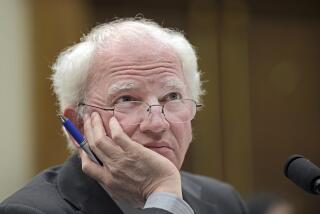Making a Practice of Friendly Advice
- Share via
If you are not a lawyer, but you advise your in-laws how to file for bankruptcy or tell some friends how to fill out a petition for a divorce, are you engaged in the unauthorized practice of law? And is it illegal?
That’s exactly what one Los Angeles reader wanted to know.
The simple answer is yes, you would be practicing law, and unless you are a card-carrying member of the State Bar, you would be committing a crime.
“A vast array of advice that is daily given by accountants, real estate agents, insurance adjusters, bankers and even newspaper columnists is technically within the definition of the practice of law, as most states define it,” Deborah L. Rhode, professor of law at Stanford University, explains. She is a visiting professor at Harvard this year.
Rhode, who authored a well-known study on the subject in 1981, points out that even some of the advice of syndicated columnist Ann Landers could be construed as the unauthorized practice of law.
Misdemeanor in California
In California and in about 35 other states it is a misdemeanor to practice law without a license.
Before you start worrying about a visit to the slammer, let’s try to figure out precisely what is meant by the “unauthorized practice of law.”
As a Supreme Court justice once said of obscenity: “I know it when I see it.” But that doesn’t help define it.
Some states don’t bother to define the unlicensed practice of law; they just make it illegal. Other states offer a laundry list of activities that are prohibited. Still others, according to Rhode, take a somewhat circular approach, saying, in effect, “the practice of law is what lawyers do.” For instance, Rhode Island defines it as doing any act “usually done by attorneys in the course of their profession.”
In California, the practice of law is not specifically defined in the statute that prohibits it. However, California courts have developed their own definition. It is not simply the rendering of legal services in court that is banned. The courts have defined law practice in a larger sense to include: “legal advice and counsel, and the preparation of legal instruments and contracts by which legal rights are secured” both in and out of court.
However, it is not illegal for a paralegal or legal assistant to assist in the preparation of legal documents as long as the work is done under the direct supervision and control of a licensed member of the State Bar.
For the practice of law to be illegal, the services must be performed by a non-lawyer for another person. It is not illegal to appear in court on your own behalf, research your own legal problems or use other self-help methods to pursue your own legal rights.
Prohibitions against practicing law without a license are intended to protect the public from the incompetent or the unscrupulous.
“A non-lawyer who undertakes to handle legal matters is not governed as to integrity or legal competence by the same rules that govern the conduct of a lawyer,” according to the American Bar Assn. Model Code of Professional Responsibility, which has been adopted as the bar’s code of ethics in many states.
Complaints From Critics
Critics complain that the ban against non-lawyers rendering any legal services--even routine matters such as filling out legal forms--is nothing more than a greedy attempt by lawyers to protect their monopoly and may even be unconstitutional.
The definitions of the practice of law are so perverse, Rhode says, that intelligent, knowledgeable non-lawyers, when asked questions about the law, are “expected to sit Sphinx-like in the face of even the most rudimentary inquiries.”
The critics may have had an impact. As of the first of the year, instead of investigating complaints about unauthorized practice, the State Bar refers the complaints to local district attorneys, according to the State Bar’s director of unauthorized practice.
Regardless of the policy arguments, you should know that you do technically violate current law if you are not a lawyer admitted to practice in the state and you advise others concerning their legal rights or render legal services on their behalf, whether or not you charge a fee.
Attorney Jeffrey S. Klein, a member of The Times’ corporate legal staff, cannot answer mail personally but will respond in this column to questions of general interest about the law. Do not telephone. Write to Legal View, You section, The Times, Times Mirror Square, Los Angeles 90053.


